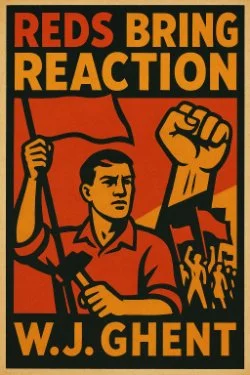The Reds Bring Reaction
By W. J. Ghent (Author), Colin Heston (Introduction) Format: Kindle Edition
To understand The Reds Bring Reaction, one must begin with the upheavals of the early 20th century. The Bolshevik Revolution of 1917 inspired a wave of leftist movements around the world and deeply alarmed Western governments. In the United States, the postwar period brought labor unrest, anarchist bombings, and heightened fears of Bolshevism. The result was the "First Red Scare" (1919–1920), which saw mass deportations, the Palmer Raids, the suppression of radical speech, and the widespread erosion of civil liberties.
Ghent, a writer long associated with progressive and socialist causes, viewed this climate with alarm. He did not oppose socialism—indeed, he had previously published works such as Our Benevolent Feudalism (1902) and Mass and Class(1904), both critical of capitalist structures—but he believed that the radical fringes of the socialist movement were jeopardizing the very reforms they sought. The Reds Bring Reaction is his intervention, a call for sobriety and responsibility within the left.
In today’s world of polarized politics, social media echo chambers, and the radicalization of both right and left, Ghent's message is strikingly modern. He reminds activists that rage is not a strategy, and that symbolic protest, when disconnected from public sentiment, can be counterproductive. He challenges progressives to think tactically, not just morally.
The Reds Bring Reaction is a powerful, timely meditation on the dangers of political absolutism and the fragility of reform. It is a work of both intellectual depth and moral clarity. Ghent’s warnings, though born of his time, speak across the decades. They caution us that history is not kind to those who mistake destruction for transformation or confuse noise with progress. For those seeking to understand the dialectics of political change—how hope can curdle into fear, how revolution can trigger repression—Ghent offers a vital lesson: the methods of a movement matter as much as its goals. In this, his voice remains as relevant as ever.
This edition has been reformatted, designed, abridged and annotated with an introduction by renowned novelist and story writer Colin Heston.


